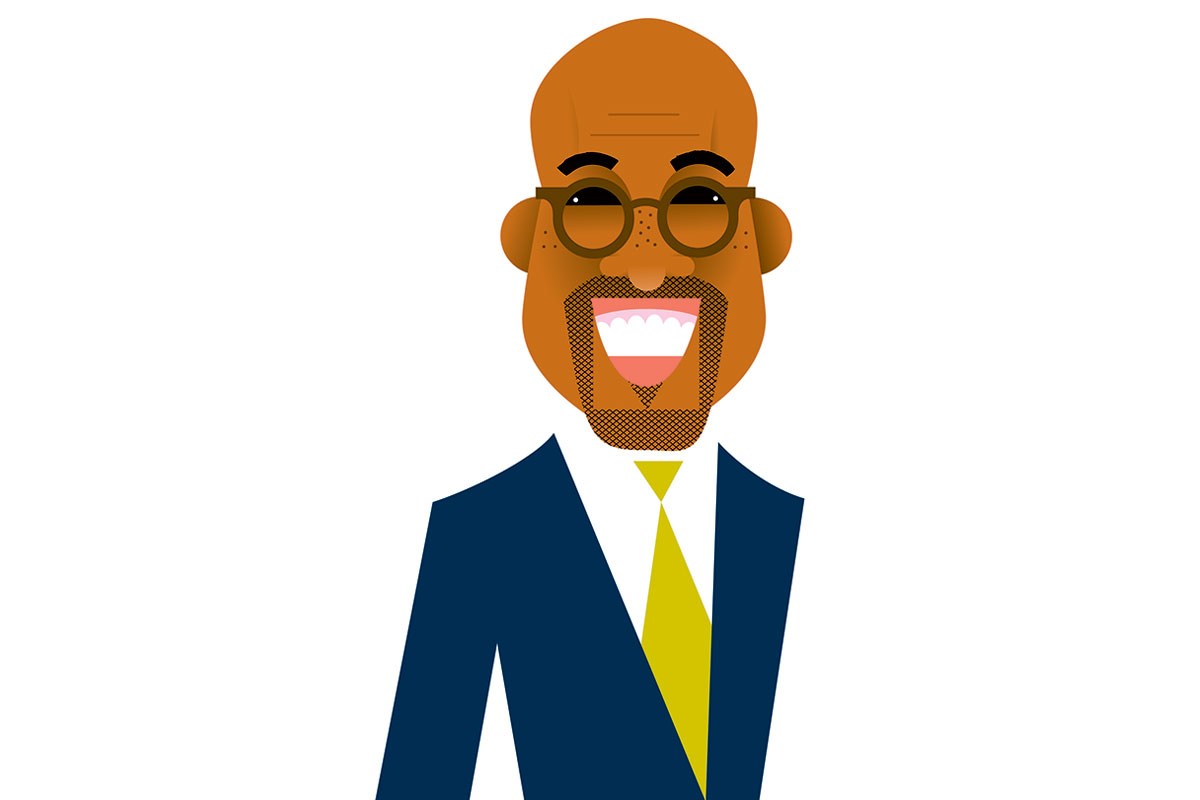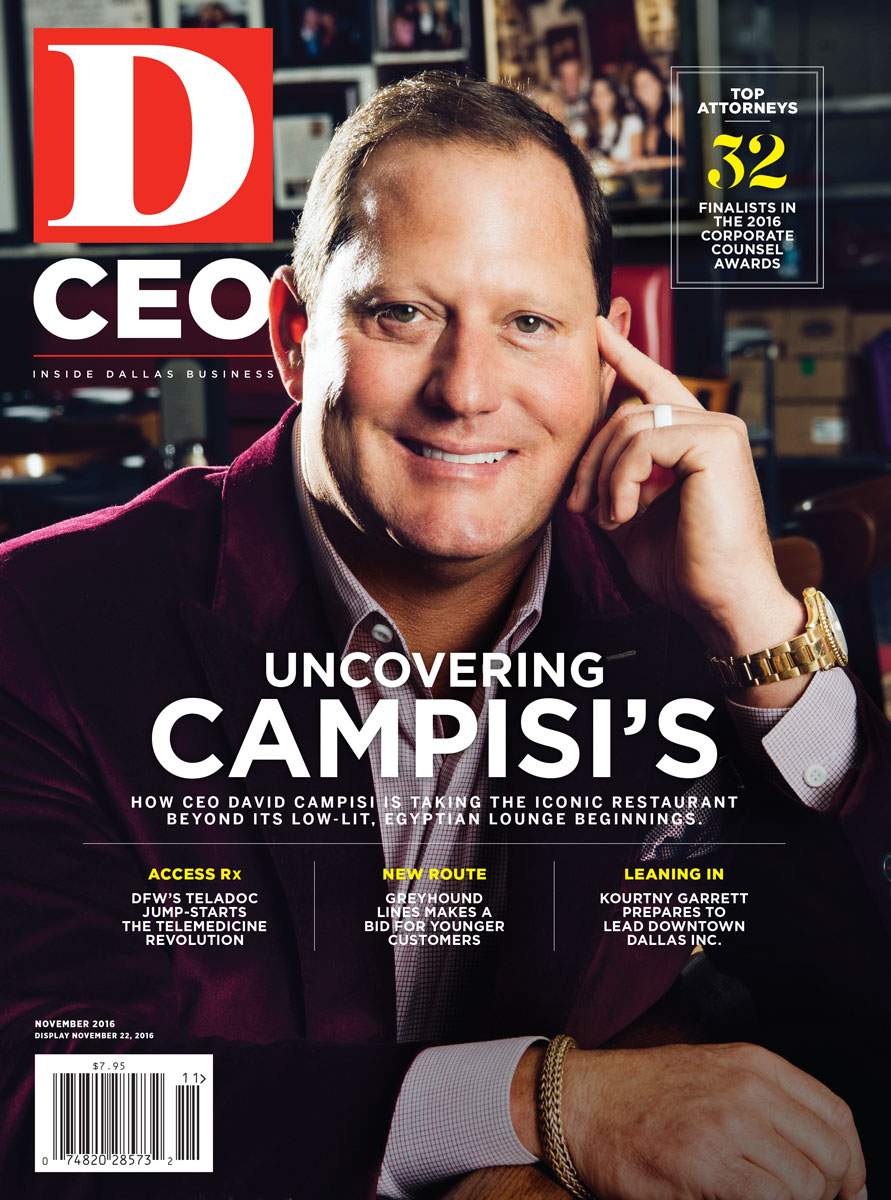When we meet for lunch at The Capital Grille in Dallas’ Crescent development, Michael J. Sorrell opts for the lobster salad. The choice is apt because Sorrell—president since 2007 of Paul Quinn College, a private, faith-based school in South Dallas—doesn’t eat red meat or dairy or many fried foods outside of a few chicken wings.
Sorrell, 49, says it has been that way ever since the birth of his son, Michael Augustus Sorrell, in 2010. “I was never a heavy drinker, but now I don’t drink at all. I want to set as good an example as I can—as a college president, as an authentic leader, as a father,” he says. “If there’s something I can do that makes things better, I attack it with a missionary zeal. So I’m always asking myself, ‘What can I do better?’”
Sorrell’s single-minded determination was desperately needed when he took over at Paul Quinn in 2007. The historically black school, founded in 1872 by preachers from the African Methodist Episcopal Church, had fallen on tough times. Think plummeting enrollment and donations, abandoned buildings, piles of debt, no fewer than five presidents in five years.
Sorrell, who was the fifth, had never been a college president. What he brought to the table was determination and a penchant for success. The son of “upper-middle class” parents who were successful entrepreneurs—they “expected me to be a leader,” he remembers—Sorrell attended private and Catholic schools in Chicago. He earned a B.A. in government from Ohio’s Oberlin College, where he was a two-time captain of the men’s varsity basketball team and graduated as the fifth all-time leading scorer.
After Oberlin, Sorrell got J.D. and M.A. degrees in public policy from Duke University, as well as an Ed.D. (in 2015) from the University of Pennsylvania. In Dallas he worked for three law firms and started his own company before joining the struggling Paul Quinn. There, he embarked on the challenge first by reading everything he could about being a college president. Next he either phoned or visited with at least 30 of them, including R. Gerald Turner of Southern Methodist University and Gary Cook at Dallas Baptist University. “If you’re going to do something,” he says, “I think you should be a student of your craft.”
From day one, Sorrell was bent on change. “I arrived at an institution that was a year away from going away,” he says. “We just blew it up and rebuilt it.” Among many improvements, the president implemented a “business-casual” dress code on campus. To save money, he canceled the school’s football program. He literally turned the football field into an “urban farm,” with students growing lettuce, tomatoes, bell peppers, and other vegetables. (Ninety percent of the produce is sold to local restaurants and Legends Hospitality at AT&T Stadium; the rest is donated to local food programs.) Sorrell also reduced tuition by about $10,000, in part by rolling out a program requiring students to work between 10 and 20 hours a week. He attracted support from companies such as J.C. Penney, Oncor, and PepsiCo, as well as from businessman Trammell S. Crow and the Harold Simmons Foundation.
When the Southern Association of Colleges and Schools voted to strip Paul Quinn of its accreditation in 2009, the college obtained a legal injunction to block the move. Soon it applied to, and was accepted by, another accrediting body—the Transnational Association of Christian Colleges and Schools. “From 2007 to 2011-2012, we were just trying to right the ship,” Sorrell says. “The last five years, something special has been going on. Everything is trending in the right direction.”
Today Paul Quinn boasts 450 students—78 percent of them black and nearly 20 percent Hispanic—compared to just 195 five years ago. Sorrell was named one of America’s “10 Most Innovative College Presidents” by Washington Monthly magazine. And the school’s 140-acre-plus campus off Interstate 45 is about to embark on an ambitious real estate development program, from new apartments to retail space, for the first time in its history.
Finishing up lunch, Sorrell says he’s been hitting the basketball court lately, practicing hard for an upcoming charity game with the Dallas Police Department. It’s yet another example of Sorrell’s single-minded determination. His children will be attending the game, he explains, and he doesn’t want to embarrass them—or himself.
Sorrell, 49, says it has been that way ever since the birth of his son, Michael Augustus Sorrell, in 2010. “I was never a heavy drinker, but now I don’t drink at all. I want to set as good an example as I can—as a college president, as an authentic leader, as a father,” he says. “If there’s something I can do that makes things better, I attack it with a missionary zeal. So I’m always asking myself, ‘What can I do better?’”
Sorrell’s single-minded determination was desperately needed when he took over at Paul Quinn in 2007. The historically black school, founded in 1872 by preachers from the African Methodist Episcopal Church, had fallen on tough times. Think plummeting enrollment and donations, abandoned buildings, piles of debt, no fewer than five presidents in five years.
Sorrell, who was the fifth, had never been a college president. What he brought to the table was determination and a penchant for success. The son of “upper-middle class” parents who were successful entrepreneurs—they “expected me to be a leader,” he remembers—Sorrell attended private and Catholic schools in Chicago. He earned a B.A. in government from Ohio’s Oberlin College, where he was a two-time captain of the men’s varsity basketball team and graduated as the fifth all-time leading scorer.
“I’m always asking myself, ‘What can Io better?’”
After Oberlin, Sorrell got J.D. and M.A. degrees in public policy from Duke University, as well as an Ed.D. (in 2015) from the University of Pennsylvania. In Dallas he worked for three law firms and started his own company before joining the struggling Paul Quinn. There, he embarked on the challenge first by reading everything he could about being a college president. Next he either phoned or visited with at least 30 of them, including R. Gerald Turner of Southern Methodist University and Gary Cook at Dallas Baptist University. “If you’re going to do something,” he says, “I think you should be a student of your craft.”
From day one, Sorrell was bent on change. “I arrived at an institution that was a year away from going away,” he says. “We just blew it up and rebuilt it.” Among many improvements, the president implemented a “business-casual” dress code on campus. To save money, he canceled the school’s football program. He literally turned the football field into an “urban farm,” with students growing lettuce, tomatoes, bell peppers, and other vegetables. (Ninety percent of the produce is sold to local restaurants and Legends Hospitality at AT&T Stadium; the rest is donated to local food programs.) Sorrell also reduced tuition by about $10,000, in part by rolling out a program requiring students to work between 10 and 20 hours a week. He attracted support from companies such as J.C. Penney, Oncor, and PepsiCo, as well as from businessman Trammell S. Crow and the Harold Simmons Foundation.
When the Southern Association of Colleges and Schools voted to strip Paul Quinn of its accreditation in 2009, the college obtained a legal injunction to block the move. Soon it applied to, and was accepted by, another accrediting body—the Transnational Association of Christian Colleges and Schools. “From 2007 to 2011-2012, we were just trying to right the ship,” Sorrell says. “The last five years, something special has been going on. Everything is trending in the right direction.”
Today Paul Quinn boasts 450 students—78 percent of them black and nearly 20 percent Hispanic—compared to just 195 five years ago. Sorrell was named one of America’s “10 Most Innovative College Presidents” by Washington Monthly magazine. And the school’s 140-acre-plus campus off Interstate 45 is about to embark on an ambitious real estate development program, from new apartments to retail space, for the first time in its history.
Finishing up lunch, Sorrell says he’s been hitting the basketball court lately, practicing hard for an upcoming charity game with the Dallas Police Department. It’s yet another example of Sorrell’s single-minded determination. His children will be attending the game, he explains, and he doesn’t want to embarrass them—or himself.
Get the D CEO Newsletter
Stay up to speed on DFW’s fast-moving business community with weekly news reports, interviews, and insights.






